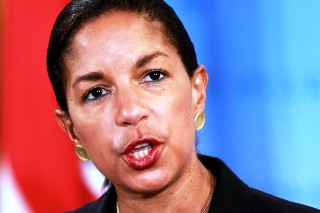US security advisor against arms ban on S. Sudan: report
January 26, 2014 (JUBA) – The United States security advisor, Susan Rice has for months resisted appeals from key allies, including Britain and France, to push for a weapons bans on South Sudan, diplomats, human rights advocates and congressional officials told Foreign Policy (FP) magazine.

Both Power and Kerry have reportedly argued internally that South Sudan’s Salva Kiir has ignored Washington’s diplomatic appeals to halt the killings in the ongoing conflict, calling for more coercive measures, including an arms embargo on the young nation.
Violence broke out in South Sudan over a year ago, pitting president Kiir’s Dinka tribe against Nuer, the country’s second largest ethnic group to which his former deputy, Riek Machar belongs.
Since then, tens of thousands of people have been killed and nearly two million displaced in South Sudan’s worst-ever violence from the time it seceded from neighbouring Sudan in July 2011.
Last year, the US, European Union and Canada imposed sanctions on military generals from both sides of the South Sudanese conflict for allegedly obstructing talks mediated by regional leaders.
There have also been several calls for an arms embargo on South Sudan from activists, local and international human rights groups.
Rice reportedly argued that an arms embargo would undermine a democratically-elected government’s ability to defend itself against an insurgency led Machar, also accused blamed for mass atrocities.
Rice also is concerned that an embargo would be ineffective because South Sudan’s neighbor and military ally, Uganda, would not enforce it even if one were imposed, sources told FP.
“I understand that the blockage came from NSC,” one UN Security Council diplomat was quoted as saying, referring to the White House National Security Council.
“Both Power and Kerry are much more open to sanctions, possibly even including an arms embargo, than the NSC. We have the sense here in New York that they wanted to move forward but they were hampered by Washington.”
The diplomat, who spoke on condition of anonymity given the confidential nature of the deliberations, reportedly said Washington recently indicated its willingness to consider such measures on Juba.
South Sudan’s rival factions, despite pressure from the international community, recently signed a re-unification agreement seeking to address root causes of the conflict destabilising the country.
An arms embargo, analysts say, would be a leeway for both warring parties to consider peace options, instead of military confrontations.
Last week, Washington reportedly sent a draft resolution to the UN Security Council members Britain, China, France, and Russia, that threatens to impose an asset freeze and a travel ban on top government and rebel leaders responsible for committing atrocities or thwarting regional efforts to strike a peace deal.
The resolution, a senior US official hinted, would also open the door to the “prospect” of an arms embargo at some time in the future.
But the draft which threatens to impose unspecified additional penalties on the warring parties for continuing violence, includes no specific reference to an arms embargo,” diplomatic sources reportedly said.
It remains unclear whether China and Russia would allow an arms embargo to pass as South Sudanese continues to lobby against it.
A coalition of 29 South Sudanese and international human rights groups recently warned of new attacks on civilians, citing the import of new weapons into South Sudan, a country already awash with weapons.
“An arms embargo would help to halt the supply of weapons to individuals and groups who have committed serious violations of human rights, war crimes and crimes against humanity, and protect civilians at grave risk,” reads the 7 January letter to Obama.
Last week, the UN peacekeeping department reportedly presented the Security Council with a confidential white paper documenting efforts by South Sudan to impede international efforts to protect civilians.
It reportedly said South Sudan government had blocked and delayed the delivery of vital military equipment for peacekeeping contingents from China, Ethiopia and Kenya.
That, in turn, has delayed those nations from deploying security forces to protect civilians, the confidential paper reportedly stated.
According to FP, Washington’s failure to act so far on UN sanctions has exposed its long-standing criticism that it applies double standards on human rights, punishing its enemies while letting its friends get away with mass murder without any consequences.
“They have been threatening to impose sanctions for a long time,” said Philippe Bolopion, the UN representative for Human Rights Watch, which has been pressing US to back an arms embargo against the South Sudanese government and the rebels.
“The threats are getting old and harder to take seriously now,” he added.
South Sudan could lose between $22-28 billion if its ongoing conflict continues for the next one to five years, the London based Frontier Economics warned in its latest report.
(ST).
